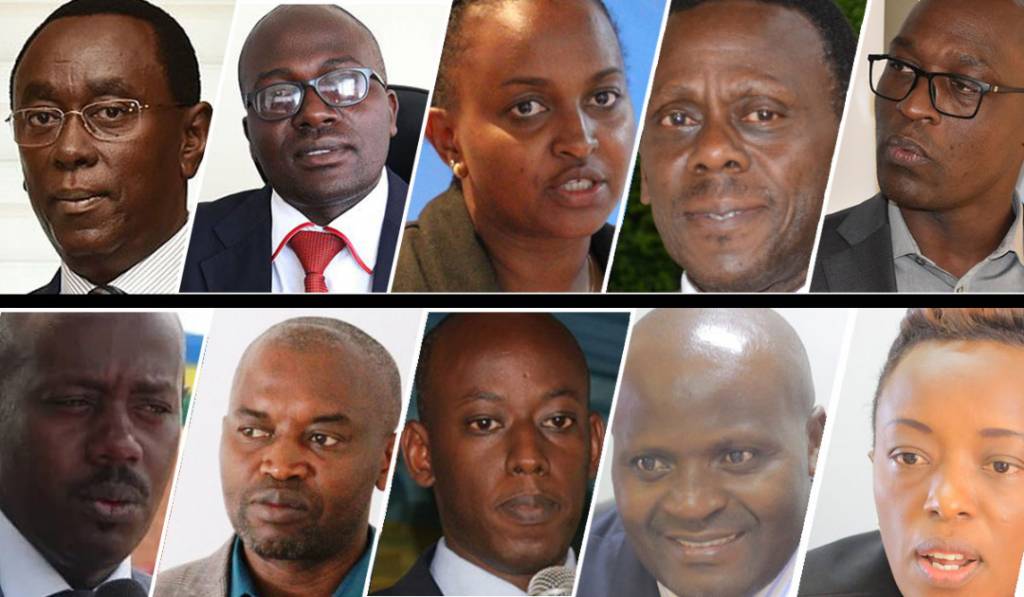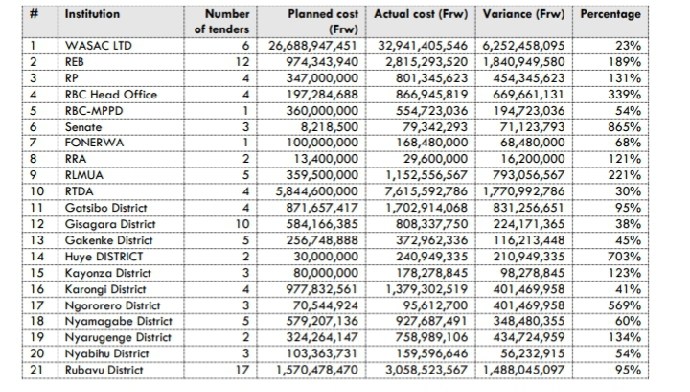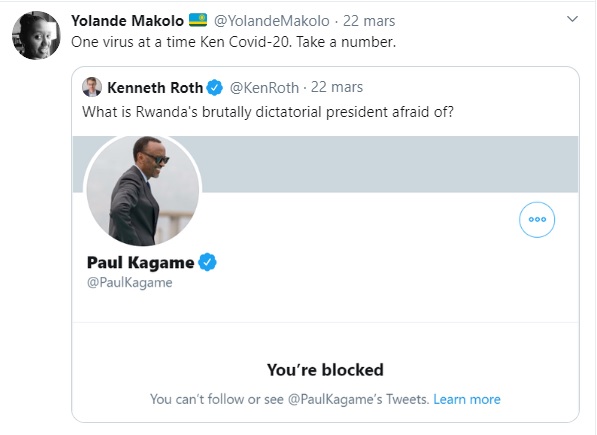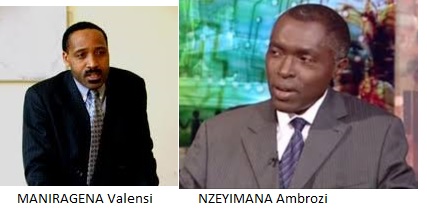
THEY WERE IN CHARGE: Former Senate President Bernard Makuza; REB Director General Dr Ndayambaje Irenée; former RBC Director General Dr Conco Jeanine; Rwanda Polytechnic Vice Chancellor Dr James Gashumba; WASAC CEO Eng. Aimé Muzola; Gatsibo District Mayor Richard Gasana; Ngororero District Mayor NDAYAMBAJE Godefroid; Gisagara District Mayor Rutaburingoga Jerome; Huye District Mayor Sebutege Ange; Rubavu District Habyarimana Gilbert; and RLMUA Director General Espérance Mukamana
Government institutions are overspending billions of Rwandan Francs each year, from local to Senate level. As The Chronicles reports, there is a pattern behind that needs to be addressed. Not only to avoid such tremendous overspending in future, but also to regain the citizens' trust.
Imagine a situation where a team of government officials prepares projects to spend Rwf 1.5billion, only to return to national treasury excusing themselves that it actually cost Rwf 3billion. Yet, the over payment didn't happen with one on single tender, there are multiple tenders from the same institution.
How about one agency where the budget for given tasks was Rwf 8million. But then when it came to paying after the supplier has completed the task, the client institution paid over Rwf 79m.
As if that is not bad enough, there is another government institution which prepared a budget for the activity and submitted it to the ministry of finance. However, then conducted a feasibility study after the budget had been approved. As a result, the taxpayer paid an extra Rwf 831m on the original budget. Costly consequences of confusion and incompetence.
The cases we are highlighting above are not fiction. They are a snapshot inside a 1,739-page report of the Auditor General of state finances for the period June 2018-June 2019. The voluminous report was handed to Parliament on May 15.
The report details unimaginable wastage of taxpayers' money. Government agencies are flashing the meagre resources the country has, down the drain with little regard of the pain ordinary people are living through. It is as if they are competing on who or which agency spends the most.
Water provider WASAC is the biggest culprit in the AG report. It gave out six tenders, for which it paid an extra Rwf 6.25billion. It could suggest, CEO Eng. Aimé Muzola approved more than a billion Francs for each of the tenders.
The project in question was called: Design, Rehabilitation, Upgrading and extension of Water Supply Network in six (6) Satellite Cities (Huye, Muhanga, Musanze, Nyagatare, Rubavu and Rusizi). The project was divided into 6 Lots (different tenders). The Auditor General found many irregularities in each of the tenders.
The irregularities include: Tenders awarded without undertaking prior project independent feasibility studies; Awarding both design, rehabilitation, upgrading and extension of Water Supply Network to one contractor; and Long delays in tendering process resulting into expiration of bids.
This particular above project is not the only one in WASAC with questionable tenders. In fact, the Auditor General dedicated nearly 30 pages of the report to highlighting concerns in WASAC tenders. In total, 87 pages of the whole report are about WASAC, making it with biggest coverage from the report. In Parliament, the AG Biraro described WASAC as "exceptional" in how it misuses taxpayers money.
In the Senate, the upper house of Parliament, where you would expect strict adherence to laws and regulations, there are no differences from a rural district.. Staff of the Senate prepared tenders, whose final prices went up more than 5 times. The over payment did not happen with to one tender contract, or two tenders. No! The over pricing spending of activities happened with 3 three different tenders. At the time, Bernard Makuza, also a former Prime Minister, was the Senate President.
The Auditor General found that for the three tenders, the Senate planned to pay a total of Rwf 8.2million. However, by end of the contracts, the Senate had paid a whooping Rwf 79.3million or an incredible increase of 865%.
At the Rwanda Biomedical Center (RBC), an autonomous agency of the Health Ministry and which is currently leading Rwanda's handling of the COVID-19 pandemic, the way taxpayer's money is used there, is mind-boggling.
During the year June 2018-June 2019, it put out four tenders, all for a total of Rwf 197.2 million. By the time the work was completed, it had paid out Rwf 866.9m, or an explosion of over Rwf 669.6m. At the time, RBC was headed by Dr Conco Jeanine, who was recently replaced.
"Unreasonable" figures – says AG

WASAC LTD – Water and Sanitation Corporation Limited Company; REB – Rwanda Education Board; RBC – Rwanda Biomedical Centre; RBC MPPD – RBC Medical Procurement and Production Division; FONERWA – Rwanda Green Fund; RRA – Rwanda Revenue Authority; RLMUA – Rwanda Land Management and Use Authority; RTDA – Rwanda Transport Development Agency
The waste is not happening at the central government alone. Actually, it is worse in the districts. Rubavu district, one of the with its relatively big towns Gisenyi, also bordering DR Congo, paid out excessive amounts for various projects. They repeated the overpayment in 17 tenders.
For all these Rubavu tenders, the total budget was slightly above Rwf 1.57billion. When the Auditor General Obadia Biraro looked into Rubavu district's books, he found they had actually paid out an additional Rwf 1.48billion. The Mayor Habyarimana Gilbert and his team was very happy to pay spent 95% more than planned.
In Gatsibo district, eastern Rwanda, led by Richard Gasana, the team scheduled and called for contractors on four tenders – all together totaling Rwf 871.6million. Unbothered, the Gatsibo team signed off payment of nearly Rwf 1.8billion, or in excess of Rwf 831million.
In the words of the Auditor General, what happened in Gatsibo is that the "feasibility study [were] done after budgeting". To put it bluntly, the district team imagined the estimated numbers for cost of items, then issued the contracts, and only after then went out to look at prices on market after. Yet it should have been thew other way round.
At the Rwanda Education Board (REB), after looking through their tender payments, the Auditor General called them "unreasonable" – just a taste of the angry language used in the audit report.
According to the Auditor General, what is causing this overpayment by state institutions is the inability of the officials in charge to plan properly. For nearly all the cases audited, the AG says: "The… significant increase in estimated costs of tenders is mainly due to the fact that no market research was conducted before award of these tenders."
However, it beats logic as to how a combination of technical and political officials, can do the same mistake of not doing market research on multiple tenders, a feat happening overtime. It, to say the least, doesn't make sense.
The AG report we have reviewed is the latest. In many instances in this report, the AG says same overpayments were noted in previous years. As is with the common practice, top officials of the audited agencies will be summoned to Parliament's watchdog the Public Accounts Committee (PAC) in the coming months.
While in PAC, in the full glare of the media, the officials will be ridiculed and harassed, and some expectedly sent out of committee sessions, as MPs demand for answers that never come.
Unscrupulous businesspeople
The Chronicles spoke to officials at 3 three institutions, all of whom declined to go on record. All said they cannot comment on the Auditor General's report. One of them said they have began preparing for the imminent roasting in Parliament, and that will be it.
"Let me give you a very simply example. The Minister will call me at 11pm telling me 'we need 200 classrooms in two months'. What do you expect me to do?," said one Mayor who preferred to remain anonymous. "Don't forget that by end of the year, I have received such countless of such phone calls. You add up the figures yourself."
In August last year, anti-genocide campaign group Never Again released findings from a two-year study on the IMIHIGO performance contracts. It gave grim reading. Officials silently complained of about unbearable targets forced on them from the highest levels of government.
Officials cited "urgent priority", as the wording used when receiving new directives. These emerge without warning, sometimes from a speech by President Paul Kagame or complaints raised at one of the many local political forums.
In the Never Again study, a Senator is quoted as saying: "When people are constantly under pressure to deliver, the most difficult question becomes how to set people-centered local priorities. [Local leaders] are requested to urgently do ABC, etc. in order to materialize, let's say, presidential pledges and other ambitious government-led development goals. In so doing so, some local leaders fall short in considering and paying attention to local priorities as defined by local populations."
An official from Gatsibo district said: "I ask for facilitation from the executive committee, but the response is 'there is no budget for that'…."
The Chronicles has been told that armies of unscrupulous businesspeople run meticulous schemes where they connive with officials inside agencies. The networks know the pressure that heads of government agencies face.
As a result, there is no market research when a task comes. Instead, they will be rushing to complete the a project, no thorough market research is done ignoring the and costs involved are neglected, if not ignored. Very often, according to multiple sources, the officials get their share of big contract later.
This perhaps explains why the treasury drags its feet when it comes to paying contractors. As a measure to control expenditures, the finance ministry runs a centralized payment system where all contractual invoices from state agencies are wired to the treasury. It makes the payment.
At the annual national dialogue Umushyikirano in December last year, it emerged that government owes suppliers of local government entities alone over Rwf 20 billions. When all other sectors are added up, government may be owing the private sector hundreds of billions.
 THEY WERE IN CHARGE: Former Senate President Bernard Makuza; REB Director General Dr Ndayambaje Irenée; former RBC Director General Dr Conco Jeanine; Rwanda Polytechnic Vice Chancellor Dr James Gashumba; WASAC CEO Eng. Aimé Muzola; Gatsibo District Mayor Richard Gasana; Ngororero District Mayor NDAYAMBAJE Godefroid; Gisagara District Mayor Rutaburingoga Jerome; Huye District Mayor Sebutege Ange; Rubavu District Habyarimana Gilbert; and RLMUA Director General Espérance Mukamana
THEY WERE IN CHARGE: Former Senate President Bernard Makuza; REB Director General Dr Ndayambaje Irenée; former RBC Director General Dr Conco Jeanine; Rwanda Polytechnic Vice Chancellor Dr James Gashumba; WASAC CEO Eng. Aimé Muzola; Gatsibo District Mayor Richard Gasana; Ngororero District Mayor NDAYAMBAJE Godefroid; Gisagara District Mayor Rutaburingoga Jerome; Huye District Mayor Sebutege Ange; Rubavu District Habyarimana Gilbert; and RLMUA Director General Espérance Mukamana WASAC LTD – Water and Sanitation Corporation Limited Company; REB – Rwanda Education Board; RBC – Rwanda Biomedical Centre; RBC MPPD – RBC Medical Procurement and Production Division; FONERWA – Rwanda Green Fund; RRA – Rwanda Revenue Authority; RLMUA – Rwanda Land Management and Use Authority; RTDA – Rwanda Transport Development Agency
WASAC LTD – Water and Sanitation Corporation Limited Company; REB – Rwanda Education Board; RBC – Rwanda Biomedical Centre; RBC MPPD – RBC Medical Procurement and Production Division; FONERWA – Rwanda Green Fund; RRA – Rwanda Revenue Authority; RLMUA – Rwanda Land Management and Use Authority; RTDA – Rwanda Transport Development Agency





